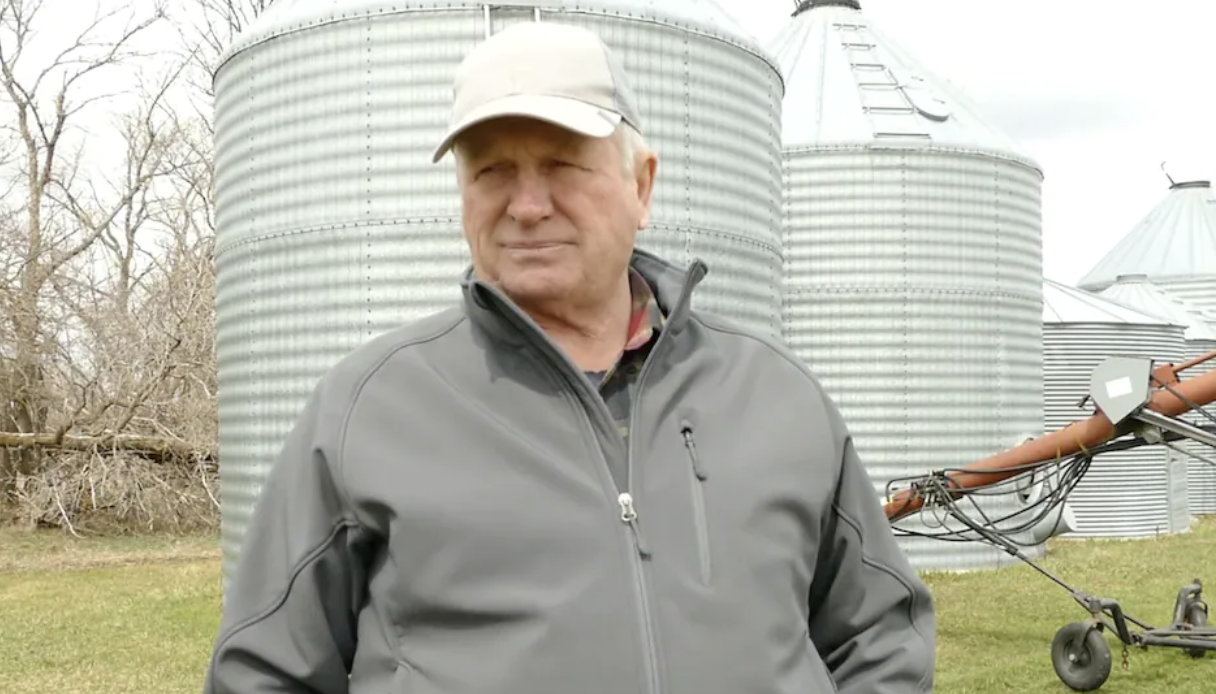
Delivering on Value
Annual Report 2021-2022
We are here to help you succeed.
The KAP team is committed to advancing the prosperity of Manitoba farmers.
The basis of everything we do is founded in the pursuit of being the unified voice for farmers on issues that matter to them the most.
KAP is dedicated to playing a lead role in driving progress, leading with transparency, and revealing to key audiences’ farmers true impact and contribution.

“What I am most proud of this year is working in collaboration with all aspects of the value chain. It shows when we work together we can make a difference for the whole industry.”
— Bill Campbell, President
President’s Annual Report Message
By Bill Campbell
If you asked me to describe the past year at Keystone Agricultural Producers, the word that comes to mind is “progress”. Our job at KAP is to ensure that we are working towards the future. A farm future that is sustainable and profitable, but most importantly prosperous. Our progress this year in impacting that goal has been ensuring that KAP is building a foundation to serve its members for years to come.
Foundational Strategy
KAP’s foundational progress has been led by the Board of Directors and has included the start of a governance review, legal review, bylaw updates, and the development of a governance committee.
The new governance committee is chaired by Chuck Fossay who has extensive knowledge and history of KAP as well as a robust understanding of governance practices. The main role of the governance committee is to ensure KAP’s ongoing governance practices are compliant with the organization’s bylaws and to work alongside the Board to modernize KAP’s structure. This will ensure that the organization is financially sustainable for the long-run and represents modern farming operations.
All of this work in 2022 has been done to set the stage for the development of a new strategic plan beginning in 2023, focused on stabilizing KAP and delivering on value to its members.
2022 Challenges and Successes
In 2022, there were many continued challenges for producers. We faced a spring flood that impacted many producers, increased input costs, and an inconsistent supply chain that had delays on everything, from new parts to seed. The other burning issues that come to mind are around sustainability and environmental stewardship by producers, specifically how policy is being set by government, the public discourse we hear in society, and how this all affects public trust of our sector.
These are areas of concern in agriculture that I truly believe are at the forefront right now. While these issues do exist and are a focus, we must ensure the economic viability of production and maintaining our food security commitments in Canada and around the globe. Our team at KAP has been working with our farmer members and partner organizations to advance priorities and solutions that address these challenges.
In the past year KAP has continued to advocate for the increased rebate on education property tax, the reduction in Ag Crown Lands rent for 2023, an increase in funding for the new Sustainable Canadian Agricultural Partnership, and removal of the reference margin limit for AgriStability. Each of these priorities have seen progress due to the collaborative advocacy efforts of not only KAP, but key partners provincially and nationally.
Our efforts focused on sustainability included the signing of the MOU for 4R nutrient stewardship and the promotion of the practices that it encourages. The number of farmers utilizing these practices, like variable rate application and regular soil testing, continues to grow every year. In 2021, 54% of canola growers in Western Canada indicated they are following the basic 4Rs (an increase of 10% from 2020). 34% of western Canadian wheat growers are soil sampling for nitrogen annually. This again is another example of how at KAP we are looking to promote continuous progress and improvement in everything we do.
KAP has also launched the new online Environmental Farm Plan (EFP) platform. The EFP is a voluntary, confidential, self-assessment of your farm. Environmental farm planning helps to identify risks on farms to develop action plans to address those risks. Launched in October 2022, the EFP program is now online to ensure that the administrative burden to producers is lessened and is more efficient.
Another proud moment this year was our relaunch of our safety program, newly named FarmSafe Manitoba. This program has a new look, feel and direction. There is a new website (www.farmsafemanitoba.ca) which will act as an information hub for ongoing resources and tools that can be accessed at any time, from anywhere. The FarmSafe Manitoba program additionally has a council made up of safety stakeholders including farmers, commodity associations, and other safety delivery agencies.
Labour has also been top of mind for the KAP team as there is recognition that agriculture’s labour shortages are one of the largest barriers the industry faces. In 2022, the team developed a labour task group bring alignment on solutions and potential opportunities to resolve labour gaps in agriculture. A successful outcome from this initiative was the advocacy effort on securing funding for additional veterinary seats at the Western College of Veterinary Medicine. These 5 seats are specific to large animal veterinary care and is an investment of over $500,000.
As I sign off of my final report as President, I want to thank everyone for the opportunity to serve Manitoba producers and be their voice, and to leave you with some thoughts. KAP is positioned to deliver on advocacy, regulatory modernization, and policy priorities in an ever-changing world. We cannot do it alone; we need you, our grassroots members, to stay involved and have your voice is heard to ensure farmers maintain a seat at the table with decision-makers. As Jack Welch, former Chairman and CEO of General Electric, said: “Control your own destiny, or someone else will.”
Our Value Proposition to Members
-
To best support KAP’s vision for a sustainable and profitable future for all Manitoba farmers, the Manitoba primary agricultural sector must come together with common goals and objectives. KAP will provide leadership in driving the agenda, building consensus within the sector and being the voice of Manitoba farmers.
-
KAP must reveal to key audiences’ farmers and modern agriculture’s true impact and contribution. This action requires KAP to have clear brand recognition that is focused on transparency and trust. This will be supported through the building and maintaining of meaningful relationships within industry, and by providing valuable engagement and outreach.
-
KAP needs to continue to work towards a stable regulatory future for Manitoba farmers. Through the utilization of KAP led, partnership-based initiatives the goals are both defensive in nature, to correct limiting or misguided regulations, as well as promoting smart regulations that will help advance Manitoba’s agriculture sector.
-
KAP requires a stable foundation to allow for the delivery of its vision and mission. Stable governance and funding are a key step in ensuring a prosperous future.
Advocacy
Our objective is to provide a unified voice for Manitoba’s farmers and advance the key policy objectives in the sector by working with members, stakeholders and all levels of government.
Engagement and Outreach
We work everyday to develop a unified narrative focused on building trust in Manitoba farmers and modern agriculture. This narrative is designed to expand overtime to improve its relevance and create connections between government, the public, agricultural stakeholders, and Manitoba farmers.
Regulatory Modernization
Develop initiatives that will potentially mitigate regulatory risk related to further legislation and oversight for Manitoba farmers.
Foundational Strategy: Governance and Funding
The KAP board has developed and implemented a plan that stabilizes KAP to ensure long-term delivery of value to its members.
-
Key Activities
-Evaluate KAP’s current compliance with bylaws and governance procedures
-
Key Activities
-Complete legal review with counsel regarding legislation compliance
-Engage in governance review with Strive facilitator
-Create Governance Committee to work in partnership with Grassroots Committee
General Manager’s Annual Message
by Brenna Mahoney
When I looked forward to 2022 in last year’s Annual Report, I emphasized the goal of developing stronger collaboration within Manitoba’s agricultural community. In looking back on the year, I am very pleased to report to you that we have made significant progress on this front.
Labour shortages has been identified by many of KAP’s members as one of the key impediments to continued growth of our sector. KAP has responded by leading a Labour Task Group, whose members are drawn from provincial commodity organizations. The Task Group has been charged with developing a common “Made in Manitoba” path forward on the labour file. We have actively engaged the provincial government, including delivering agriculture’s message to the Immigration Task Force formed by Minister Jon Reyes. One of the early successes of this group was to push for measures that will increase the number of large animal veterinarians in Manitoba. This call was answered when Minister Derek Johnson announced additional funding for more spaces at the Western College of Veterinary Medicine. The labour shortage is not going to be solved overnight, and KAP will continue to work with our commodity members, and national organizations like the Canadian Agricultural Human Resources Council to give our producers the tools they need to attract skilled workers to Manitoba’s farms.
The unified effort on the labour file demonstrates the value of collaboration across commodity organizations. This collaborative model is the basis for the development of an Advisory Council, to be co-chaired by KAP and the Department of Agriculture, that will provide policy direction and advice to the governments of both Manitoba and Canada. The Council is comprised of the leadership of the commodity group members of KAP and will be holding its first meeting in February of 2023.
Agriculture policy across the country is changing. We are seeing new pressures to adopt sustainable production practices. There is talk of additional regulations aimed at greenhouse gas reduction targets. Publicly funded research is seeing changes in priorities. The voice of the farmer is not always being heard when these new policy directions are launched. By coming together under the Advisory Council umbrella, we will be more effective in developing unified messages to governments and regulators. The likelihood of agriculture’s voice being heard by policy makers is vastly improved if we deliver united positions.
A common voice from agriculture in 2023 is especially important as it is an election year in Manitoba. Now is the time that political parties are developing their policy platforms. Agriculture is a driver of economic growth and jobs in both rural Manitoba as well as our urban centres. We want each party to recognize this basic fact in their election platforms and include policies that will help us grow both primary production and our value-added sector.
KAP has a fantastic team of staff. We have been advocating for farmers on many files in 2022, from seed regulation modernization, grain transportation issues, shifting the school tax away from land, environmental initiatives, and the new national policy framework known as the Sustainable Canadian Agricultural Partnership. I am proud of our team and I know that by working together with our individual members, and our commodity group members, the voices of Manitoba’s farmers will impossible for governments to ignore in the year to come.










